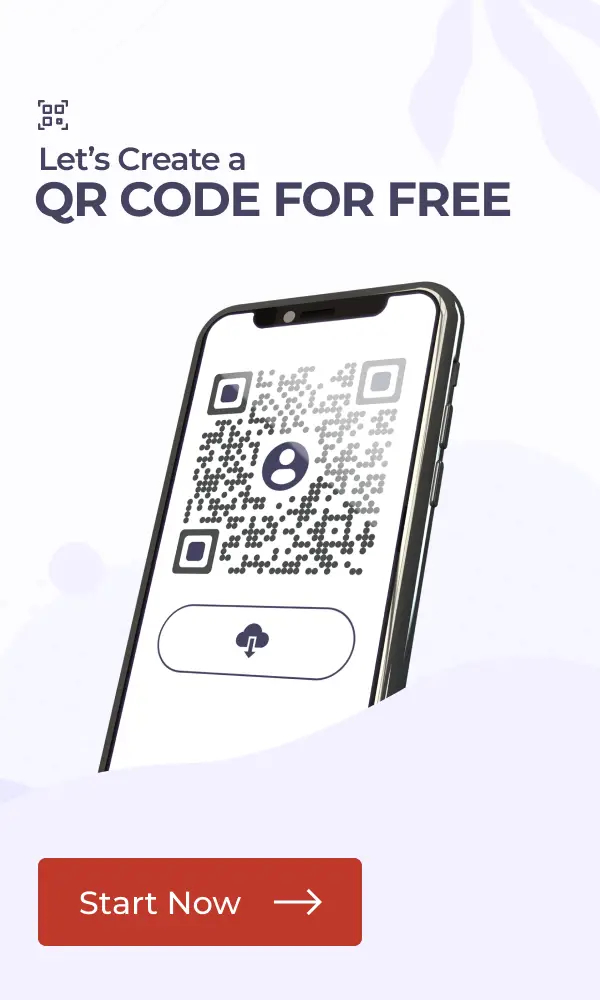Can you create QR Code for anything? Find Out Now!
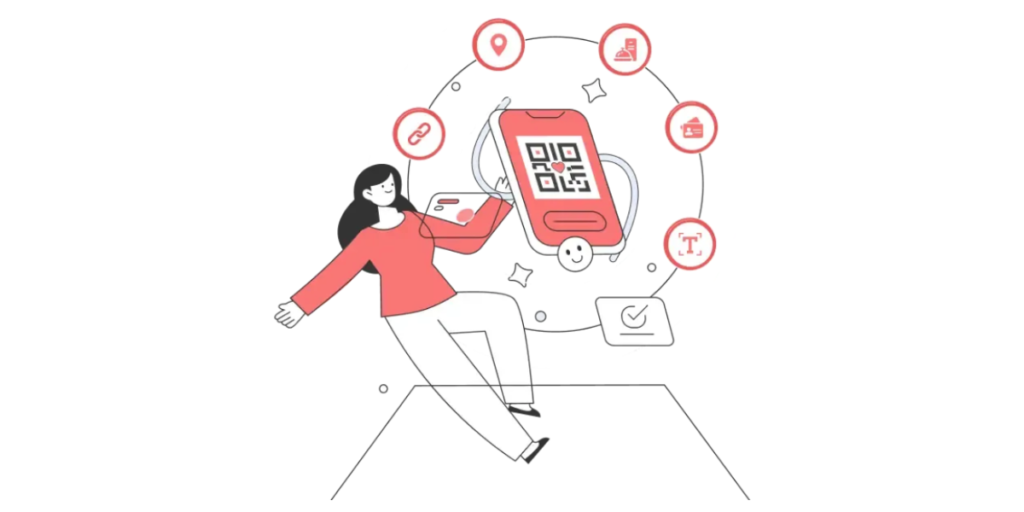
In a nutshell: Yes, you can create QR Code for anything – a website, text, WiFi, or even a playlist. This guide explains how to do it using a QR Code generator free tool. You’ll learn about static vs. dynamic QR Codes and how to customize the design.
A. Can you create QR Code for anything?
Yes, absolutely. Whether it’s a link, a business card, an image, or an audio file, or even your WiFi password – you can literally create a QR Code for anything. All you need is the right QR Code generator.
According to Scanova, QR Code usage is skyrocketing! Between 2020 and 2024, QR Code creation soared by 301.51%, with an annual growth rate of 38.11%.
And, this number keeps growing as QR Codes enter new spaces like smart packaging, event check-ins, and digital business cards.
In this article, we’ll show you how to make your own QR Code for anything fast, easily, and without coding.
Let’s begin!
B. What can a QR Code be used for?
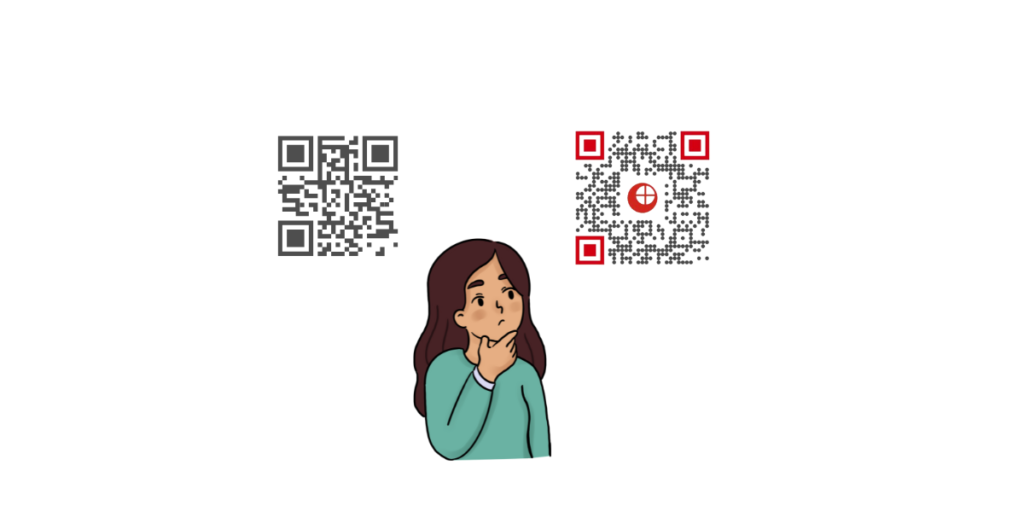
QR Codes are more than just black and white squares. Here are some of the most popular and creative QR Code use cases in 2025:
1. Share a website or link instantly
With a QR Code for link, you can direct users to:
- Your blog
- Your online store
- YouTube video
- Your portfolio
- Or a booking page
This way, there’s no need for people to type URLs; they can just scan the QR Code and go.
Pro Tip: Want to promote your latest video or product? You can use a free QR Code generator to create a scannable shortcut. The easier you make it for people to reach you, the better the engagement will be.
2. Smart business cards
With a business card QR Code, you can ditch the old paper cards and go digital. You can use a QR Code for contact info that instantly saves your name, phone, email, and business with one scan.
It’s fast, digital, and unforgettable.
Pro Tip: You can even design a custom QR Code to match your brand colors or add your logo. Scanova reported a 6% increase in the number of custom-designed QR Codes over the past three years, which suggests a growing interest in personalized branding.
3. Event invitations and RSVPs
If you’re planning a wedding or webinar/conference, a QR Code can:
- Link to a Google Form
- Add the date to someone’s calendar
- Show the event location on Google Maps
All you need to do is just print or email the QR; it’s that easy.
4. Link to social media profiles
Use a QR Code for link to promote your:
- TikTok
- Facebook page
This is perfect for posters, business cards, and flyers.
Pro Tip: If you want to boost your online following on multiple social media platforms with just one scan, you can use a Social Media QR Code; it’s a single QR Code for all your social media accounts.
5. Instant WiFi access
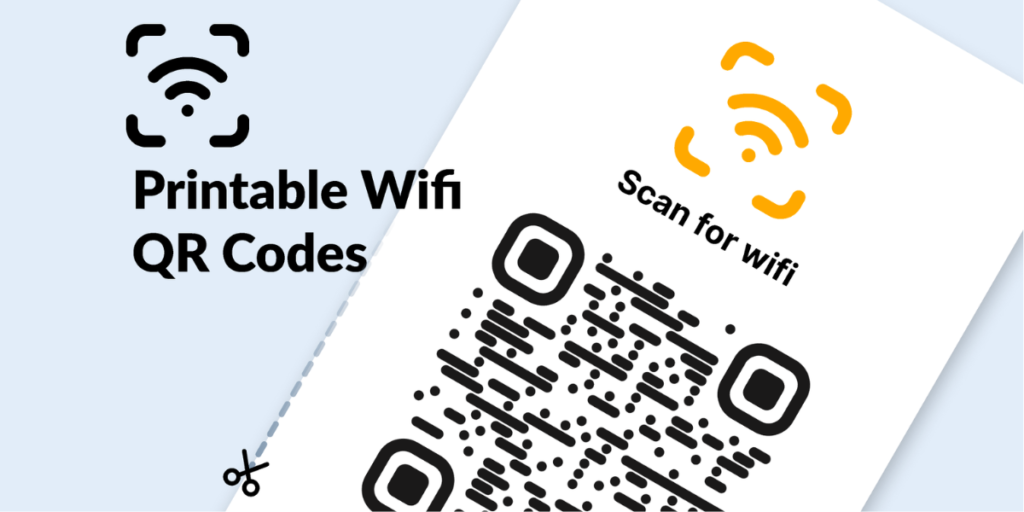
It’s 2025, you know you can make things convenient for your guests. Just generate a Wifi QR Code that connects people to your WiFi without needing the password.
This is especially great for:
- Homes
- Offices
- Cafes
- Airbnb properties
Pro Tip: You can use a QR Code generator free to create one in seconds. Try Scanova’s free QR Code generator to create your own Wifi QR Code.
6. Show plain text or instructions
If you want to display a quote, short note, or emergency info, you can use a QR Code for text.
It’s great for:
- Product instructions
- Locker codes
- Workshop tips
- School assignments
Pro Tip: Since text QR Codes are usually static in nature, they don’t need the internet to work. People can just scan and read the text, even if they’re offline..
7. Share files and documents
Let’s say you need to send a PDF, image, or video? Well, for that you can use a Document QR Code or an Image QR Code, or even a video QR Cod,e depending on the need.
Or, alternatively, you can use a custom dynamic QR Code to link to a file hosted online. Update the file anytime without changing the QR Code.
Dynamic QR Codes are a lifesaver for product manuals, menus, and training documents.
8. Menus and food ordering
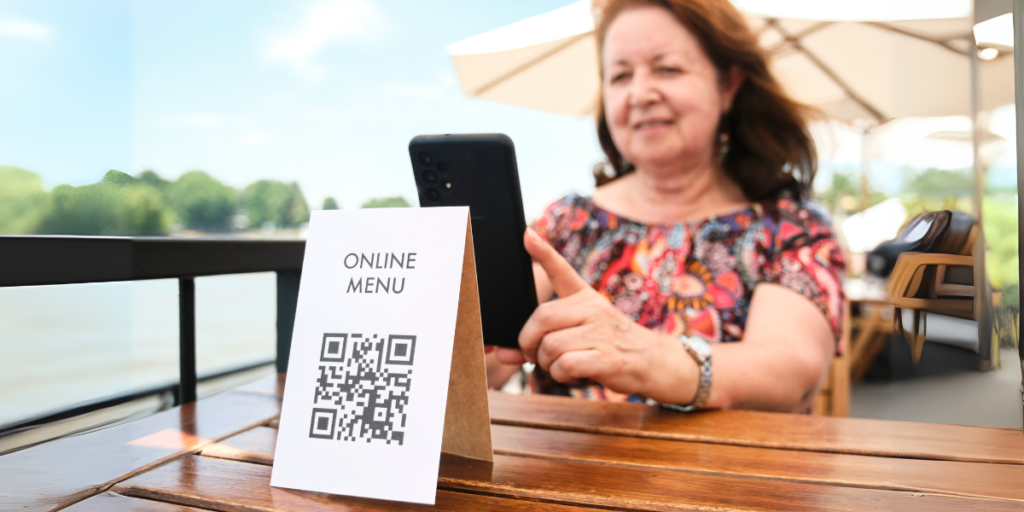
Restaurants now actively use QR Codes for menus to let people browse, order, and even pay from their phones.
And not just that, a dynamic restaurant QR Code can help you update items in real time – no reprinting needed.
9. Payments and donations
This is probably one of the most common use cases of QR Codes. With a payment QR Code, you can let users scan and pay with UPI, PayPal, or credit card links.
It’s perfect for:
- Fundraisers
- Freelancers
- Small business owners
10. App downloads
You can promote your app by linking a QR to the App Store or Google Play. The best part? One QR Code works for both iOS and Android.
Use an App Store QR Code that redirects users to the app download page based on the device.
11. Track marketing campaigns
Dynamic QR Codes are the smarter and more versatile QR Codes. They offer advanced features like editing and tracking, and they can be reused any number of times.
Did you know that, according to Scanova’s internal data, nearly 98% of all QR Codes created are dynamic ones? This highlights the growing trend towards flexibility and real-time tracking.
You can use dynamic QR Codes to track:
- Number of scans
- Locations
- Devices used
It’s great for offline marketing as well, be it flyers, posters, billboards, etc., and gives you real, data-driven, actionable results.
QR Codes are simple, flexible, and can be used anywhere. Whether you’re sharing a link, text, WiFi, or a business card, whatever your use case is, believe it or not, there’s a QR Code for that.
Now that you know what QR Codes can be used for, let’s see how you can create them. Keep reading.
C. How to create a QR Code for anything?
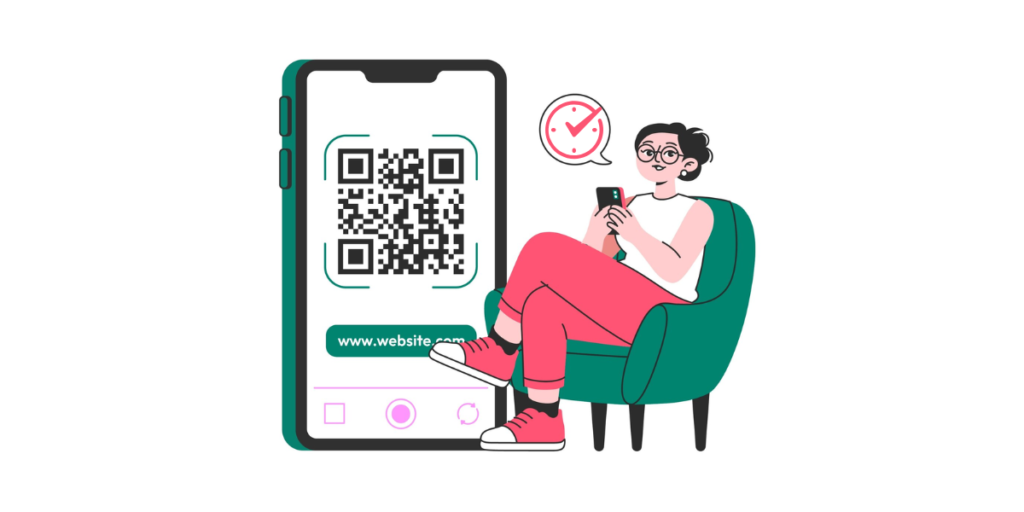
You’re in luck. With the right personal QR Code generator, you can turn just about any digital content into a scannable experience.
Let’s walk through the simple steps to make your own QR Code easily:
Step 1: Find the right QR Code generator
To begin, you’ll first need a QR Code generator that lets you create both static and dynamic QR Codes based on your needs.
You can search online for options but honestly, sorting through lots of webpages for the right tool can get overwhelming fast.
So, to save time, check out this comparison guide of the best QR Code generators out there. It will definitely help you pick the right tool for your specific use case.
Or, if you want to skip the research…Just go with Scanova, it’s a trusted platform that lets you create QR Codes for almost anything (with over 24 different QR Code types).
Step 2: Select your content type and create a QR Code
1. Go to Scanova.
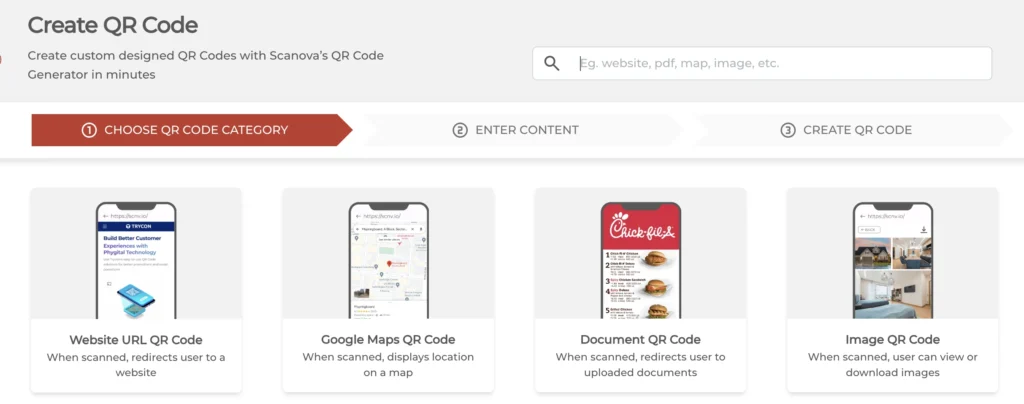
2. On the page that loads, choose what type of QR Code you want. Choosing the type of QR Code would depend on what you would like your QR Code to link to.
Pick what your QR Code should do:
- Open a website
- Show a message (text)
- Save a contact
- Connect to WiFi
- Link to files, videos, etc.
- And much more
Scanova leaves it up to you to choose your preferred category by offering you many options (24 different QR Categories to be precise).
3. Let’s say you picked a Website URL QR Code, you’ll just paste your link and hit “Continue.”
4. Next, give your QR Code a name that you can easily recognize later. Click “Create QR Code.”
5. You’ll now see a working preview of your code. You can edit the look of your QR by choosing the “Edit Design” option.
6. Once you click this option, you will see all the recommended designs. Choose one or design from scratch and finalize the changes.
Pro Tip: A fancy-looking QR Code attracts 2X more scans than a traditional black-and-white one.
Note that to use customization options, Scanova requires you to sign up for a free trial of their paid plans (don’t worry, no card details needed). Check out the pricing details here.
Step 3: Customize your QR Code (Optional but awesome!)
When you click the Edit Design option, you have the chance to bring your QR Code to life. You don’t have to stick to plain black-and-white.
I. Add a logo for a personal touch
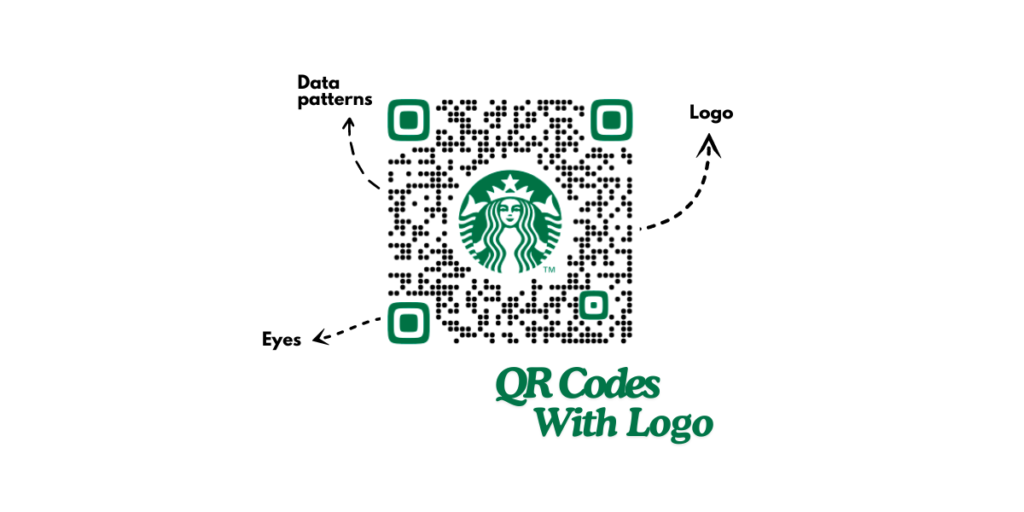
You can insert your brand logo or text using the design features. You can upload the logo image in JPG, PNG, or JPEG format, or even create a text-based logo on the spot.
If you want to make it pop, you can:
- Resize your logo
- Add an outline for contrast
- Remove data modules for style
A custom QR Code with a logo builds trust and gives a professional feel.
II. Match the color to your theme
If you want your QR Code to blend in with your resume, packaging, or invitation?
You can:
- Choose custom colors
- Add eye-catching gradients
- Style the Eyes (the corners) with unique patterns
All of this can be done under the Continue Editing tab.
III. Make it transparent (optional)
If you prefer a clean, modern look, you can use the Make Transparent option to remove the background. This is perfect for flyers, websites, or minimalist designs.
IV. Play with shapes and frames
If you don’t want a boring square QR Code, you can browse the Frames tab for creative borders and rounded shapes.
Whether it’s for a gift tag or business card, there’s something that fits your style. These customization features are available with a free trial of Scanova’s paid plans.
Pro Tip: Don’t over-design your QR Code. Keep it scannable!
Step 4: Test before you download
Once you’re done with the designing, make sure you use your phone camera or scan QR Code apps to check if it works, especially if you customized the design.
Step 5: Download and use
Lastly, click Export to save your QR Code in a high-resolution format (PNG, SVG, or PDF) based on your needs, whether you’re printing or sharing online.
D. Can you make a QR Code for information?
Yes. You can create a QR Code for text or any type of information. Here are a few cool examples:
- A QR Code that shows emergency contact info
- A QR Code on a product box that explains how to use it
- A classroom QR Code that links to reading material
QR Codes work great for sharing:
- Notes
- Quotes
- Instructions
- Short bios or summaries
E. Can you make a QR Code look like anything?
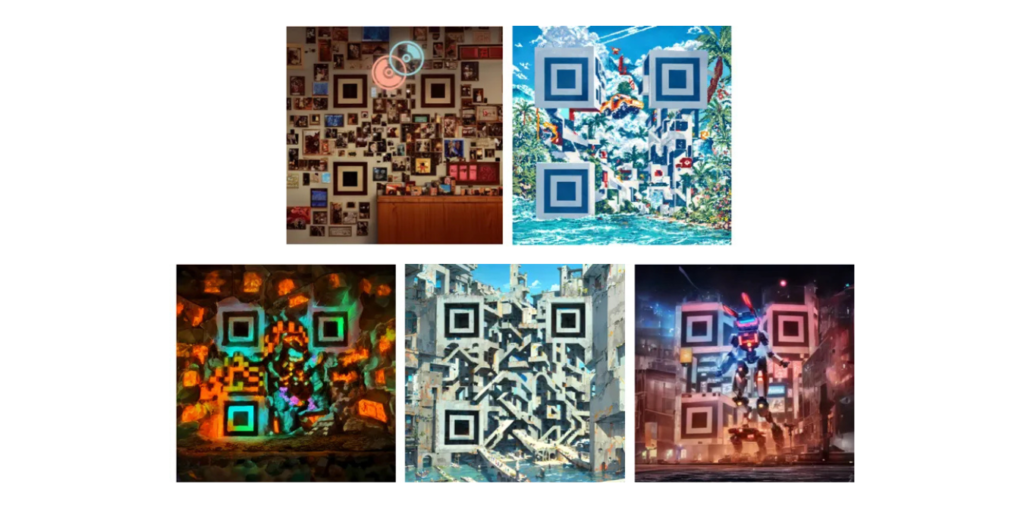
Yes, you can create a custom QR Code that blends into your brand or design theme. But there’s a limit.
Things you can do:
- Change color palette
- Add gradients
- Use rounded edges
- Insert your brand logo in the center
- Add a background image
Things you shouldn’t do:
- Overlapping too many artwork elements
- Shrink the QR too small
- Use low contrast (light on light)
QR Codes must stay readable. That means keeping a balance between design and functionality.
F. What’s the difference between Static and Dynamic QR Codes?
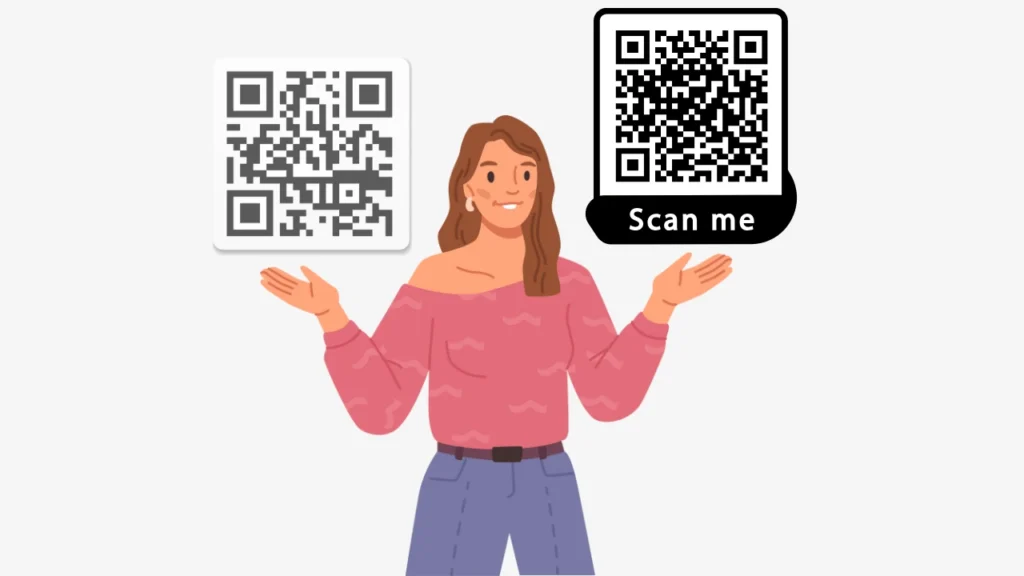
Static QR Code:
- Data is hardcoded
- Free to generate
- Can’t be edited after creation
- Great for permanent info (e.g., name, email)
Dynamic QR Code:
- Content lives on a short URL
- Can be edited later
- Trackable (number of scans, location, device)
- Ideal for campaigns, product packaging, and real-time updates
Dynamic QR Codes offer more flexibility – but they usually require a paid plan.
G. FAQs: Create QR Code for anything

1. Can I create QR Codes from my phone?
Yes! You can use mobile-friendly websites or QR Code apps to make your own QR Code directly from your smartphone.
2. Are QR Codes safe to use?
Yes, but with care. Like any tech, they can be misused. To stay safe:
- Test your QR Code before sharing
- Use reputable QR Code generators
- Avoid scanning codes from unknown sources
- Use dynamic QR codes with tracking and link controls
3. Can you make a QR Code for anything?
Yes, you can make a QR Code for nearly anything – text, URLs, emails, social profiles, files, contact details, and more.
4. How to create a QR Code for information?
Choose a QR Code generator, select “Text” or “Message,” enter your info, customize, test it, and then download.
5. Can you make a QR Code look like anything?
You can design QR Codes with custom colors, logos, and shapes but make sure you don’t compromise on scanability.
Final Thoughts: QR Codes can do it all
Whether you’re a small business owner, teacher, designer, or just someone trying to make life easier – QR Codes are one of the simplest tools out there.
With free tools like Scanova, you can create QR Code for anything in just a few clicks.
Want to get started? Start creating your free custom QR Code for anything now

